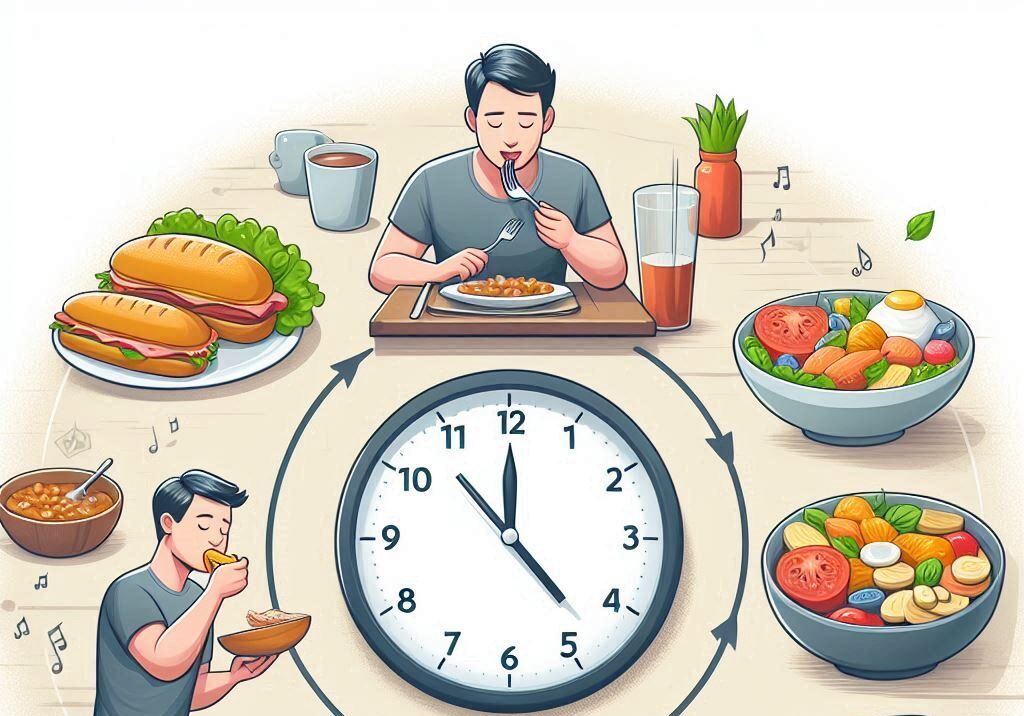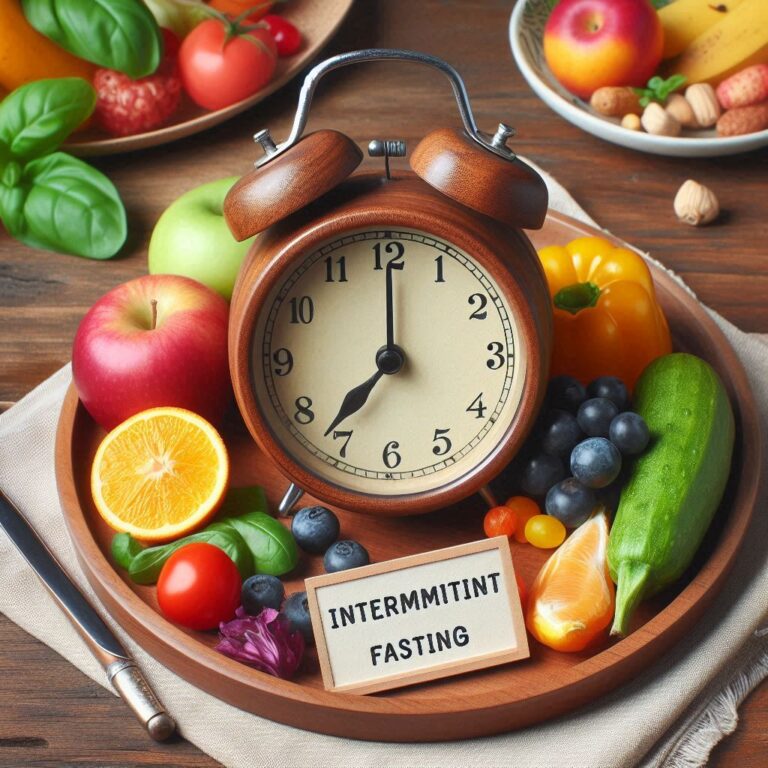How Does Intermittent Fasting Work To Lose Weight
Today, we will discuss one of my favorite topics: intermittent fasting. It’s hands down the best thing I have ever done for myself and my body. So, how does intermittent fasting work to lose weight?
I will kick things off with a snapshot of intermittent fasting. It’s a weight loss trend catching on for its simplicity and potential health benefits. At its core, intermittent fasting involves cycling between periods of eating and not eating. What’s intriguing is that it’s less about what you eat and more about when you eat.
You’ll learn how this straightforward approach taps into complex metabolic processes. It’s not just about cutting down on calories; it’s about optimizing the times when your body digests and processes food, which can lead to weight loss and other health improvements.
There are various intermittent fasting methods out there:
- In the 16/8 method, you fast for 16 hours daily and eat within the 8-hour window.
- The 5:2 method involves typical eating for five days and restricting calories for two non-consecutive days.
- The Eat-Stop-Eat approach includes 24-hour fasts once or twice a week.
Choosing something that resonates with you and fits your lifestyle is crucial.
So why does this matter? Well, intermittent fasting intersects with how the body uses energy. When you don’t eat for a while, your body exhausts its stored sugar and starts burning fat.
This isn’t just about eating less; it’s also about giving your body the right environment to switch its energy source from fats to carbs, which has a fascinating ripple effect. I’ll get into that in the next section.

The Role of Hormones and Fasting
You may be surprised that intermittent fasting does much more than limit your calorie intake. It plays a significant part in regulating various hormones linked to weight loss.
Here’s how: When you fast, your insulin levels decrease. Typically, insulin goes up after you eat, helping to store the sugar and fat from your food. But in a fasted state, low insulin levels tell your body to use stored fat for energy, which is a win if you’re looking to shed weight.
Then there’s ghrelin, often called the ‘hunger hormone.’ Intermittent fasting can help lower ghrelin levels, making you likely feel less hungry. On the flip side, leptin, the hormone that signals satiety to your brain, also has its part to play. If your body is used to less frequent eating, leptin’s effect might become more pronounced, helping you feel more content with less food.
Intermittent fasting can be stressful on your body; that’s where cortisol comes in. While short-term fasting may increase cortisol levels, it’s not necessarily bad. This temporary spike can lead to greater fat burning. The key is to manage fasting periods carefully so that stress doesn’t become chronic.
One of the brightest players in the fasting realm is HGH, or human growth hormone. Your HGH levels can skyrocket during fasting, increasing as much as fivefold. This hormone is vital for muscle growth and accelerates fat loss while helping preserve lean muscle mass.

Intermittent Fasting: An Approach to Weight Loss?
Intermittent fasting has caught the attention of people who want to lose weight and scientific researchers who study this. It’s not just a fad; it represents a shift in traditional eating patterns that could lead to lasting change.
People often find this approach liberating from the constant need to plan meals and snacks, and not worrying about calorie counting leads to less stress about food throughout the day. Also, by having clear-cut eating and fasting periods, many individuals report feeling more in control of their eating habits, which can be a big win for long-term weight management.
Physically, the list of potential health benefits extends beyond weight loss. Studies have shown improvements in blood sugar regulation, decreased inflammation, and sometimes even better heart health. But I’d be remiss if I didn’t mention that fasting isn’t suitable for everyone. Risks can include nutrient deficiencies and, in some cases, an unhealthy focus on food that may worsen eating patterns.
Summary
So, is intermittent fasting a one-way ticket to sustainable weight loss?
Intermittent fasting might offer an appealing strategy for keeping weight off in the long run due to its simplicity and adaptability. There’s no need for specialized diets or rigorous calorie tracking. You can adjust your fasting schedule as your lifestyle or goals change. And that’s the beauty of it—flexibility is at the heart of intermittent fasting.
As you consider integrating intermittent fasting into your life, remember to listen to your body and choose something that resonates with you. Start slow, consult with a healthcare provider if you have pre-existing conditions, and be patient with the process. Sustainable weight loss isn’t typically fast, and that’s perfectly okay.
So, my question to you today is: Are you ready to explore intermittent fasting as a tool in your weight loss journey?
Always remember that your first attempt doesn’t need to be your last. The road to weight loss is personal and evolving, and intermittent fasting might be the fresh perspective you need to start moving forward.
FAQs About Intermittent Fasting for Weight Loss
When you’re on a fasting journey, you might encounter common questions about its effectiveness, duration, and optimal fasting periods. Here are answers to three frequently asked questions to help you navigate intermittent fasting confidently.
1. How much can I lose in a month from intermittent fasting?
The amount you can lose with (IF) intermittent fasting varies depending on factors such as your starting weight, diet quality during eating periods, and level of physical activity.
Generally, individuals may experience weight loss of 4 to 8 pounds monthly, which translates to 1 to 2 pounds per week. However, sustainable weight loss is more than just a numbers game—it requires consistency, patience, and a holistic approach to health.
2. Is it better to fast for 12 or 16 hours?
The ideal fasting duration depends on individual preferences, lifestyle, and goals. Both 12-hour and 16-hour fasting windows are common intermittent fasting approaches. While some people succeed with a 12-hour fasting window, others opt for a 16-hour fasting period to maximize fat-burning benefits. Experimentation and listening to your body’s signals can help determine which fasting duration works best for you.
3. How long do you have to fast to start burning fat?
The body typically begins to burn stored fat for energy after depleting its glycogen (sugar) stores, typically within 12 to 16 hours of fasting. This transition to fat burning varies among individuals and can depend on factors such as metabolic rate and carbohydrate intake before fasting. Consistency with intermittent fasting and a balanced diet can facilitate the body’s shift to fat metabolism and support sustainable weight loss over time.
If you find this topic helpful, please check out my other blog, which is full of information: How Is Intermittent Fasting Healthy?
Have an incredible fasting journey!
Engage with Me!
Ask Questions: If you have any questions, please leave them in the comments below. I would love to answer your questions.








I have looked into intermittent fasting in the past. The way it leverages our body’s natural metabolic processes by cycling between periods of eating and fasting can have a profound impact on weight management and overall health.
Your detailed explanation of the various fasting methods and their effects on the body is enlightening. It’s particularly interesting how different fasting durations, like the 16/8 or 5:2 methods, can be tailored to individual lifestyles and preferences, making IF an adaptable tool for many.
What strategies can someone use to overcome initial challenges, such as hunger and low energy, when starting intermittent fasting?
– Scott
Hello, Scott,
Thank you for your comment and feedback on my explanation of intermittent fasting (IF) methods. I’m glad you found the information enlightening.
When starting intermittent fasting, it’s common to face initial challenges such as hunger and low energy. Here are some strategies that can help ease this transition:
Gradual Adjustment: Instead of jumping straight into a strict fasting regimen, gradually extend your fasting window over a few weeks. This allows your body to adapt comfortably.
Keeping Hydrated: Drinking water throughout the day can help curb hunger. Herbal teas and black coffee (without any sugar or cream) are also excellent choices during fasting periods.
Balanced Meals: During eating windows, focus on nutrient-dense meals rich in protein, healthy fats, and fiber. These helps keep you full and provide sustained energy.
Electrolytes: Sometimes, feelings of low energy can be due to electrolyte imbalances. Eating foods rich in sodium, magnesium, and potassium or considering an electrolyte supplement can be beneficial.
Distractions: Engage in activities that keep your mind off food, such as exercise, hobbies, or work. Hunger can often be more of a mental challenge than a physical one.
Sleep: Ensure you are getting adequate sleep. Good sleep can help regulate hunger hormones and improve energy levels.
Listen to Your Body: Pay attention to how your body responds. Consult with a healthcare professional if you feel excessively tired or unwell.
Remember, intermittent fasting is a flexible tool that can be adjusted to fit your lifestyle. It’s important to find a routine that feels sustainable and healthy. If you have any more questions or need further guidance, feel free to ask!
Thank for this eye-opening post, indeed Intermittent fasting can be a powerful tool for weight management and overall health. It’s really fascinating how this approach to eating schedules can impact our metabolism and energy levels. One question that comes to mind is: How does intermittent fasting affect athletic performance and muscle growth in individuals who engage in regular physical activity?
Hello, Elias,
Thank you for your thoughtful response!
I’m glad you found the post insightful. Intermittent fasting can be powerful for overall health and weight management, and it’s fascinating to see how it influences metabolism and energy levels.
Regarding your question about athletic performance and muscle growth, intermittent fasting can have varying effects depending on the individual and their specific training regimen.
Some studies suggest that intermittent fasting can enhance fat loss while preserving muscle mass, especially with resistance training.
However, getting enough nutrients during meals is vital for supporting muscle repair and growth. Athletes may need to carefully plan their meals around their training schedule to maintain energy levels and optimize performance.
As always, it is best to consult with a healthcare or nutrition professional to tailor an intermittent fasting approach that aligns with your specific fitness goals and lifestyle.
Thank you for raising this important question!
Michael